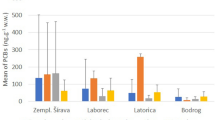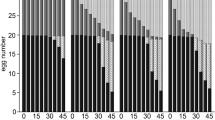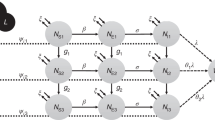Abstract
IN Africa, fish-ponds and other waters may easily become infested with large numbers of different snails, including the intermediate hosts of bilharzia1.
This is a preview of subscription content, access via your institution
Access options
Subscribe to this journal
Receive 51 print issues and online access
$199.00 per year
only $3.90 per issue
Buy this article
- Purchase on Springer Link
- Instant access to full article PDF
Prices may be subject to local taxes which are calculated during checkout
Similar content being viewed by others
References
Mozley, A., “The Snail Hosts of Bilharzia in Africa” (H. K. Lewis, London, 1951).
De Bont, A. F., “2° Rapport annuel de l'IRSAC, 1949” (1950).
Hasler, A. D., Trans. Wisc. Acad. Sci., 39, 97 (1949).
Pilsbry, H. A., and Bequaert, J., Bull. Amer. Mus. Nat. Hist., 53 (1927).
East. Afr. Fish Res. Org. 1950 Annual Report.
Author information
Authors and Affiliations
Rights and permissions
About this article
Cite this article
DE BONT, A., DE BONT HERS, M. Mollusc Control and Fish-Farming in Central Africa. Nature 170, 323–324 (1952). https://doi.org/10.1038/170323a0
Issue Date:
DOI: https://doi.org/10.1038/170323a0
This article is cited by
-
The biological control of snail intermediate hosts of schistosomiasis by fish
Reviews in Fish Biology and Fisheries (1994)
-
Lutte biologique contre les mollusques vecteurs de Bilharziose. Action predatrice de Tilapia rendalli, Boulenger et de Sarotherodon mossambica, Peters a l'égard de Biomphalaria glabrata, Say
Hydrobiologia (1981)
-
Fish culture in rice fields a world-wide synthesis
Hydrobiologia (1967)
Comments
By submitting a comment you agree to abide by our Terms and Community Guidelines. If you find something abusive or that does not comply with our terms or guidelines please flag it as inappropriate.



